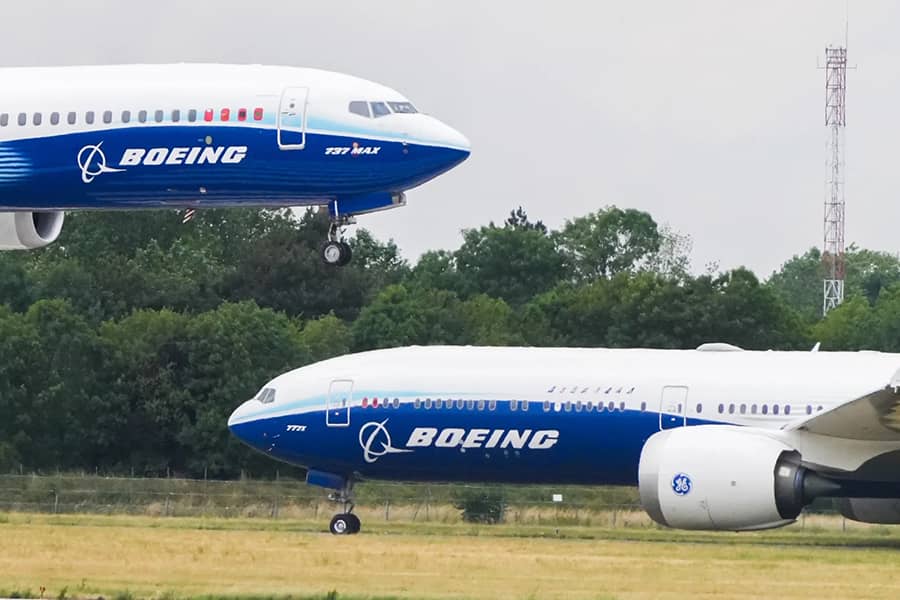The CEO of Boeing has stated that the company needs to undergo significant transformation in response to escalating losses.

Boeing’s Call for Transformation
Boeing’s call for transformation is not just a reaction to financial setbacks but a profound recognition of the shifting dynamics within the aerospace industry. As global demand evolves towards sustainability and efficiency, Boeing must harness technology to rethink its manufacturing processes. This could potentially mean investing in advanced materials and robotics, which can streamline production while enhancing safety measures. With the integration of artificial intelligence for predictive maintenance and real-time data analytics, Boeing stands at the threshold of redefining operational excellence.
Moreover, this transformation opens doors for an agile organizational culture that prioritizes innovation over tradition. By fostering a mindset geared toward collaboration—both internally and with external partners—Boeing can pivot more swiftly in response to market demands. Embracing agility will not only attract top talent seeking dynamic work environments but also strengthen relationships with suppliers who are equally invested in pioneering advancements. Ultimately, Boeing’s journey through this metamorphosis could serve as a blueprint for resilience in an era marked by rapid change and unprecedented challenges in aviation.
Overview of Boeing’s Recent Financial Losses
Boeing’s recent financial losses have prompted urgent discussions about the future trajectory of the aerospace giant. In its latest quarterly report, the company revealed staggering deficits attributed to supply chain disruptions, production delays, and a sluggish recovery in global travel demand. These setbacks have not only hampered revenue but also raised concerns among investors about long-term profitability. Furthermore, as airlines grapple with shifting consumer behaviors post-pandemic, Boeing may need to rethink its strategic partnerships and product offerings to align with emerging market dynamics.
What amplifies the urgency of transformation is the competitive landscape in which Boeing operates. Rivals are rapidly innovating, emphasizing eco-friendly technologies and advanced manufacturing processes that could leave Boeing struggling if it doesn’t adapt promptly. The company’s dependency on its legacy aircraft models presents both a challenge and an opportunity; while these models continue to generate cash flow, they risk becoming outdated in an industry increasingly focused on sustainability and efficiency. As Boeing’s leadership grapples with these multifaceted challenges, embracing cutting-edge technology alongside restructuring their operational framework may be essential for restoring investor confidence and accelerating recovery amidst unprecedented volatility in the aviation sector.
Reasons Behind the Need for Change
As Boeing faces mounting financial pressures, the necessity for transformation extends beyond mere profitability—it is about survival in an increasingly volatile market. The aerospace industry is at a pivotal juncture where technological advancements, shifting consumer preferences, and rigorous environmental regulations are redefining operational paradigms. Companies that fail to adapt not only lose their competitive edge but risk irrelevance amidst agile newcomers and innovative startups that prioritize sustainability and customer-centric designs.
Moreover, internal culture plays a critical role in this equation. A shift towards transparency and collaboration can reinvigorate employee morale while fostering innovation at every level of the organization. By embracing change as a core value rather than an obligatory response to crises, Boeing can cultivate resilience and become more agile—capable of swiftly pivoting in response to external challenges or opportunities. Engaging employees through participatory leadership not only enhances accountability but also encourages a shared vision focused on sustainable growth and excellence in engineering, positioning Boeing to turn past setbacks into future successes.
Key Areas Targeted for Transformation
In the wake of escalating losses, Boeing’s transformation strategy is poised to focus on three critical areas: operational efficiency, innovation in product development, and enhanced digital integration. Operational efficiency involves streamlining manufacturing processes to reduce costs while maintaining high-quality standards—a challenge that requires a complete re-evaluation of their supply chain dynamics. By adopting lean methodologies and optimizing production timelines, Boeing aims not only to curb expenditures but also to restore confidence among stakeholders regarding its capability to execute complex projects.
Innovation in product development represents another pivotal focus area; the company must prioritize sustainable aviation technologies and next-gen aircraft designs that align with global environmental goals. As air travel shifts towards greener solutions, Boeing’s commitment to research partnerships could yield breakthroughs in hybrid-electric propulsion systems and new materials that enhance aircraft performance while minimizing carbon footprints.
Finally, the integration of advanced digital tools across its operations stands as a cornerstone of this transformation. Embracing AI-driven analytics and predictive maintenance can empower Boeing to enhance operational oversight and preemptively address technical challenges. This data-centric approach not only polishes the customer experience through real-time insights but also facilitates smarter decision-making throughout all levels of the organization, setting the stage for long-term resilience amidst an evolving aerospace landscape.
Leadership’s Vision for the Future
The CEO’s call for transformation at Boeing is not merely about addressing immediate losses; it’s a clarion call for visionary leadership that redefines the company’s future. Embracing innovation must become ingrained in the corporate DNA, pushing beyond traditional aerospace paradigms to explore sustainable technologies and digital advancements. By harnessing artificial intelligence and automation, Boeing can streamline operations while fostering an agile workforce ready to pivot in this rapidly evolving marketplace.
This vision extends beyond just technology; it demands a cultural shift that values collaboration and continuous improvement. As employees feel empowered to contribute ideas—regardless of their rank—the company can unlock hidden potential, driving creativity and inclusivity in problem-solving. Moreover, forging strategic partnerships with tech startups and educational institutions could provide fresh insights that challenge the status quo, propelling Boeing toward becoming a more resilient player on the global stage. A bold vision is not merely aspirational; it transforms challenges into opportunities for unprecedented growth and innovation.
Challenges Facing the Transformation Process
Amidst the urgency for transformation, Boeing faces a multifaceted array of challenges that could impede its progression. One of the paramount hurdles is navigating entrenched corporate culture—a landscape where legacy mindsets may resist innovation and adaptability. Employees accustomed to traditional methods may push back against new practices, creating friction in an already pressured environment. For Boeing to thrive, it must not only implement changes but also foster a culture that embraces agility and continuous learning.
Moreover, external pressures from regulatory bodies and market dynamics further complicate the transformation process. As the aerospace sector grapples with heightened scrutiny tied to safety and environmental concerns, Boeing must innovate responsibly while maintaining compliance with evolving regulations. This delicate balance requires not just operational shifts but also strategic foresight—an understanding that agility in decision-making can be as vital as technical prowess. In this landscape of challenge lies opportunity; if navigated thoughtfully, these barriers could ultimately drive sustainable growth while reinforcing customer trust in a beleaguered brand.
Stakeholder Reactions and Industry Impact
Stakeholders across the aerospace spectrum are responding to Boeing’s call for significant transformation with a mix of concern and cautious optimism. Investors, who have seen stock values fluctuate amid ongoing challenges, are eager for decisive action that addresses systemic issues while also laying the foundation for sustainable growth. Meanwhile, employees are bracing themselves for potential organizational overhauls and cultural shifts that could redefine workplace dynamics in an industry where morale is closely linked to overall performance. The transformative journey may pose short-term challenges but can ultimately foster a renewed sense of purpose within the company.
Moreover, the broader aviation industry is watching Boeing’s moves with heightened interest, as its strategies often set precedents that ripple throughout the sector. Competitors will likely respond by refining their own operational models or advancing innovation at an accelerated pace to capture market share and improve resilience against economic headwinds. Enhanced collaboration between manufacturers, suppliers, and regulatory bodies may emerge as companies look to leverage shared insights gleaned from Boeing’s experience. This environment fosters not just competition but also collaboration—serving as a vital catalyst for efficiency and technological advancements across all players involved in air travel’s intricate ecosystem.
Innovations to Drive Competitive Advantage
As Boeing stands on the precipice of transformation, leveraging cutting-edge innovations will be crucial to redefining its competitive advantage in the aerospace industry. Embracing artificial intelligence and machine learning can enhance predictive maintenance, reducing downtime and operational costs. By analyzing vast amounts of flight data, these technologies empower engineers to foresee potential issues before they become costly problems, thereby enhancing safety and reliability—key selling points for airlines today.
Additionally, investing in sustainable aviation technologies is not just a moral imperative but also a strategic differentiator. The shift towards greener alternatives—such as hybrid-electric propulsion systems or sustainable aviation fuels—positions Boeing as a leader in an increasingly eco-conscious market. Collaborating with research institutions and startups can accelerate this innovation pipeline, allowing the company to quickly adapt to evolving regulatory landscapes while appealing to environmentally-aware consumers. Such forward-thinking initiatives could not only reignite investor confidence but also redefine Boeing’s legacy for future generations.
Timeline and Milestones for Implementation
The implementation of Boeing’s transformative initiatives will unfold in meticulously planned phases, each marked by key milestones that reflect the company’s progress and adaptability. Initially, a dedicated task force will be established within three months to assess operational inefficiencies and gather input from front-line employees across all divisions. This phase aims to foster a culture of innovation while addressing immediate areas for improvement, ensuring that every level of the organization contributes to the transformation narrative.
By the end of year one, Boeing envisions launching pilot programs targeting sustainable manufacturing practices and enhanced supply chain resilience. These initiatives are designed not only to curtail costs but also to position Boeing as an industry leader in eco-friendly aviation solutions. Following this initial rollout, stakeholders will have opportunities for feedback, allowing adjustments before broader implementation across global operations. The commitment to transparency throughout this process invites customers and investors alike into Boeing’s journey, reinforcing trust at a time when confidence is paramount amidst challenging market dynamics.
The Path Ahead for Boeing
The path ahead for Boeing is paved with both challenges and opportunities, as the company stands at a crucial crossroads. Embracing innovation will be vital; investing in sustainable aviation technologies and enhancing digital transformation can help restore its competitive edge. The growing demand for eco-friendly solutions is not merely a trend but a necessity in the modern aerospace landscape, pushing companies to rethink traditional practices.
Moreover, Boeing’s commitment to transparency and accountability must be at the forefront of this transformation. By fostering an organizational culture that prioritizes safety and ethical governance, trust can gradually be rebuilt with stakeholders—airlines, communities, and regulators alike. Strategic partnerships within tech ecosystems could facilitate quick adaptation to market shifts while positioning Boeing as a leader in developing next-generation aircraft capable of meeting future passenger needs.
Finally, engaging employees in this transformative journey will encourage buy-in at every level. Harnessing their insights can lead to innovative solutions that capture customer interests and align with sustainability goals. As Boeing navigates these tumultuous waters, the ability to redefine its identity through resilience and vision could very well end up reshaping the entire aerospace industry for years to come.




